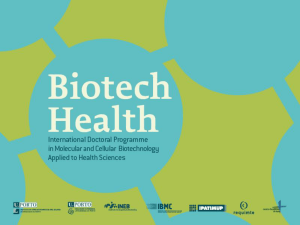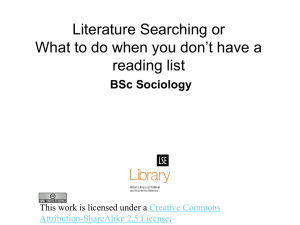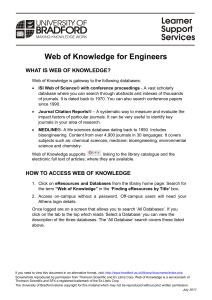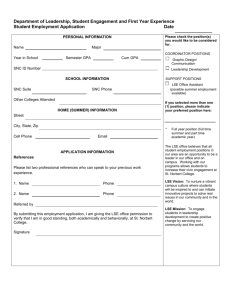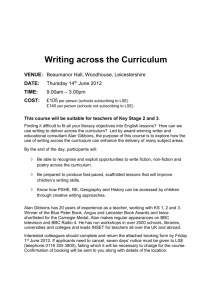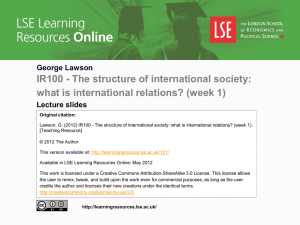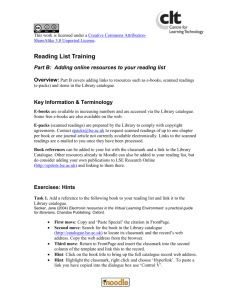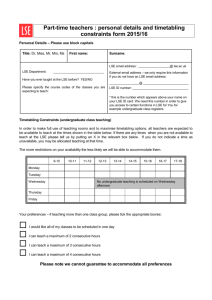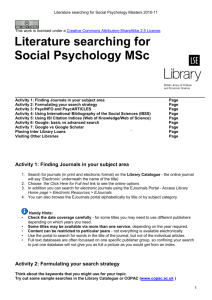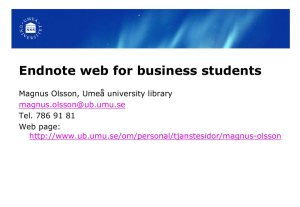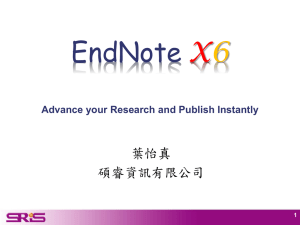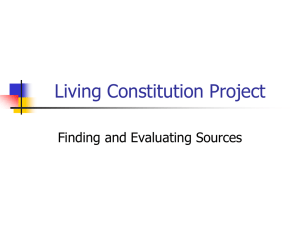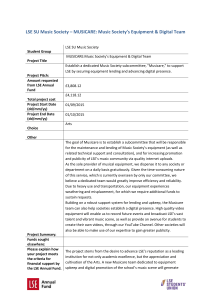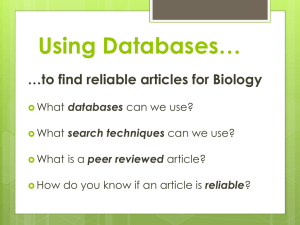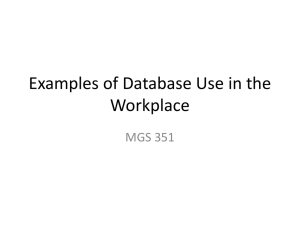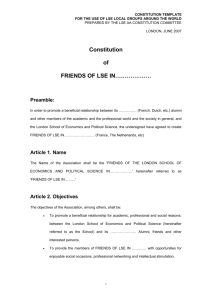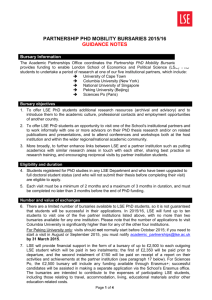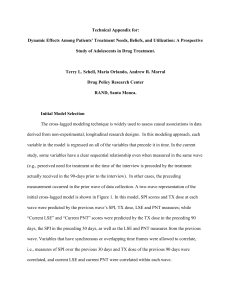Undertaking a literature search
advertisement
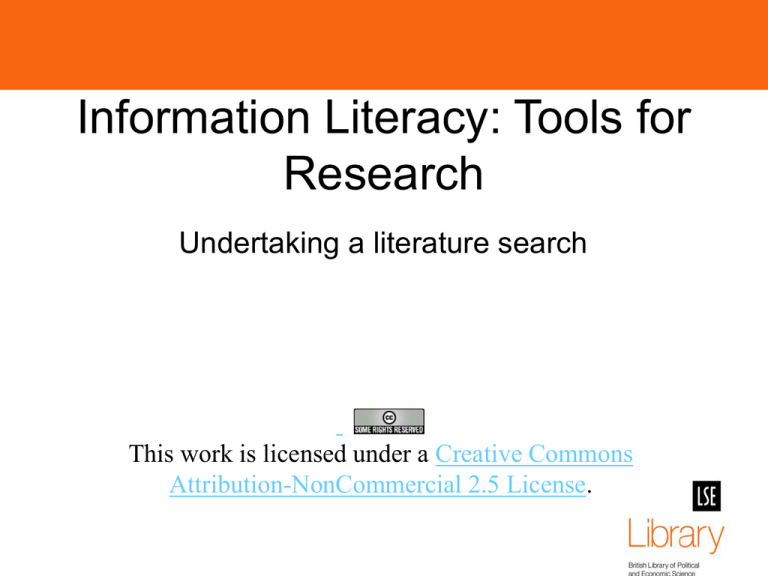
Information Literacy: Tools for Research Undertaking a literature search This work is licensed under a Creative Commons Attribution-NonCommercial 2.5 License. Introduction • Six weekly sessions designed to introduce you to many of the library tools you need for your research • Classes include: • • • • • • Introduction to literature searching Going Beyond Google Finding theses, conference papers & further research materials Primary sources: news, official publications, data, archives Managing Information Next steps and keeping up to date • Supported in Moodle where you’ll find activities, resources, PowerPoints, a discussion forum Today’s class objectives • To start your literature search and find material on your research topic: • • • • • Devise appropriate search terms Access a range of library databases Find materials not at LSE Consider how to manage your sources Compile a short list of relevant published materials on your thesis topic • A foundation for the future sessions Planning a search Image: board from Netskills quality Internet training, University of Newcastle. How to plan a search: -define topic, scope and keywords -structure your search -choose information sources -perform your searches -review your results © Netskills Quality Internet Training, University of Newcastle Search terms • Analyse your thesis topic – what are the key concepts? • Define keywords • List any synonyms • ‘The effects of television violence on children’ • • • • • Television/ TV /adverts / DVD etc Violence/aggression Children/teenagers/youth Parental control? Peer pressure? Crime? Psychological? Still undecided on your topic? • Brainstorming: • List all the keywords which could describe your topic • Identify synonyms & alternative spellings • Formulate a ‘research question’ • • • • Are they any key papers already published? Any key authors? Hot topic or dead duck? Run a quick search in a database (e.g. IBSS) to scope material Plan your research - what type of information do you need? • Journal articles, books, theses? • Conference reports? • Government reports? • Very recent material? • Historical? • English language? • UK or International? • Peer reviewed or Practitioner, Trade, Commercial? • Statistical Data? Our Data Library team can help • Archives? • Web or other sources? • Citation searching? Find what’s out there - don’t just restrict to LSE holdings The Internet is…. • A fabulous source of information, and full of information that can be used in place of books and journals. • However, there are problems…. • There is no central index • There is no quality standards or peer review • Information can: • be moved or removed without warning • be wrong, out of date and biased • be overwhelming! Why not just use the web? • Much medical & scientific information is freely available but other areas lag behind • No quality standards or peer review • Information can be moved / removed without warning • Information can be wrong, out of date, biased • Information overload • Doesn’t show the whole picture of books and journals • Can point to commercial versions of databases you can’t use - but we have access to them via LSE • Won’t include information from databases such as IBSS, Lexis You may be missing out on crucial information Journal articles • Library Catalogue – journal title level not articles • Full text online journal databases e.g. Oxford Journals, JSTOR but only limited to what is available in full text on a specific databases. • If only searched full text services would miss out on literature. Identifying books / printed materials • LSE Library Catalogue • Printed bibliographies/indices • Search other Libraries catalogues • http://www2.lse.ac.uk/library/otherLibraries/Home.aspx • COPAC: Large research Libraries, including the British Library http://copac.ac.uk/ • • • • • • Library of Congress http://catalog.loc.gov/ National Library catalogues for overseas materials WorldCat (via catalogue/subject pages) Catalogues of specialist Libraries e.g. Wellcome Library Websites of specialist organisations Amazon Exercises • Exercises 1, 2, 3 • Locating books and journals using Catalogues such as COPAC. Getting hold of material not at LSE • Senate House Library - can borrow materials and use online resources • Show your LSE card • British Library & BL Newspaper Library • • Join with 2 forms of ID (proof of address & proof of signature) All titles to be consulted in the BL Reading Rooms • SCONUL Access Scheme-Access and limited borrowing from most UK universities (no access to online resources) • Form from the Help Desk • Specialised libraries e.g. the Wellcome Library for Health • check what ID is required • Overseas Libraries may require a letter of introduction • Inter Library Loan • • Via Library Catalogue. Select Requests & Interlending Can request books, theses or journal articles • Recommendation form • Recommend the Library purchases a book Search tips for databases • • • • • • • • • • • AND &, + – combines terms. Narrows results OR , – locates results containing either of the terms. Use ‘or’ for synonyms. Useful for US/UK Spellings. Broadens results NOT – excludes terms. Discards results that contain your excluded term (even if the results contain your chosen search term) Phrases – enclose in quotation marks “third way” Proximity – WITH, SAME – locates results in same sentence or paragraph Truncation – replaces multiple characters at the end of a word e.g. pension*– finds pensioner, pensions, pensioned Wild card – replaces a single character organi?ation – locates either spelling e.g. wom?n finds woman and women wom* finds both along with womb, wombat, womble etc. Check help pages for the correct symbol. Can be * ! + $ Subject headings & Thesauri e.g. MeSH Key general resources • • • • • • ISI Web of Knowledge Scopus IBSS PAIS International IPSA Business Source Complete Scopus • Extensive index to scientific, technical, medical and social sciences literature plus arts & humanities. • Abstracts and citations to peer-reviewed research literature and quality web sources. • Over 18,000 titles • 20 million pre-1995 records, 20 million 1996• Links to full text articles via Article Finder • Searches can be saved to rerun at a later date • Results can be exported into EndNote • Citation alerts IBSS: International Bibliography of the Social Sciences • Premium Social Sciences Index- references journal articles, books, chapters and book reviews. • Links to full text articles via Article Finder • Based at LSE so journals more likely to be in stock • Good foreign language coverage • Results can be imported into Endnote • Searches can be saved to rerun at a later date • Date range: 1951• Updated Weekly ISI Citation Indices via the Web of Science/Knowledge • Science / Social Science / Arts & Humanities indices • Abstracts and references to journal articles • Links to full text articles via Article Finder • Results can be exported into Endnote • Searches can be saved to rerun at a later date • Citation alerts • Contains ISI Conference Proceedings database Exercises • Exercises 4,5 & 6 • Searching for journal literature using Scopus, IBSS, ISI social science citation index Managing information • Get organised early on! • Choose your tool – many options: • • • • • EndNote EndNote Web Zotero Delicious References in word / paper format? • Strengths and weaknesses of each • Have you used any of these before? • What do you think of them? Quick overview of EndNote • Available on all networked PCs at LSE • Using Version X.4 • Available off campus via the Remote desktop • Imports records from Library Catalogue and some databases • More in week 5…. For next week • Over the next week carry out searches in some of the databases we have used today using your key words • Which databases did you use? • Did you have any problems? • Did you export any records to EndNote? Good luck!
